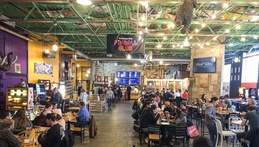Escape from a Floating Hell
Feb. 4, 2004
There wasn‘t much that could dim the natural optimism of George Petritz, a tall, handsome man who commanded World War II patrol boats in the Philippine Islands.Even after capture and more than two years in Japanese prison camps -- months of witnessing brutal beatings and surviving on meals of rice mixed with vermin, corncobs, eggshells, bones, and banana peels -- he never let go of his hope and dignity. When things became almost unbearable in September of 1944, he fervently prayed to the Virgin Mary to be safe and healthy by Christmas.
Yet events turned ugly. On December 13, 1944, Ensign Petritz and 1,618 other men in the Bilibid prison camp were herded onto the Oryoku Maru, a former passenger vessel gutted to transport troops. The Japanese intended the POWs to serve as slave laborers in its worker-starved factories. As Petritz descended into the ship‘s filthy, oven-hot hold -- reminiscent of an African slave ship -- he realized that he‘d need a miracle to survive.
CRYSTAL CONNECTION
Today, Petritz is known in Beulah -- where he lives with his wife, Althea -- as the man who bought Crystal Mountain outside the village of Thompsonville 38 years ago. Then it was a tiny ski hill and nearly bankrupt. It‘s grown since then into one of Northern Michigan‘s most popular ski resorts, recently opening 11 new slopes and drawing more than 4,000 people on a single Saturday.
Yet Petritz has a story he rarely has told. Like many World War II veterans, Petritz, 86, realizes time is short and wants to share what happened on the Oryoku Maru (pronounced oh-ree-OH-koo Muh-ROO). He was only one of two to escape the hellship that swallowed up hundreds of lives -- men who have been nearly forgotten. Each year, Petritz gratefully acknowledges the anniversary of his own freedom -- Jan. 29, 1945 -- the day he was picked up by a PT boat and began his journey home.
Petritz‘s story began in the prison camps where he showed a keen resolve to retain a sense of dignity honed from a privileged upbringing in Rockford, Illinois. He had arrived at the Cabanatuan prison camp in May of 1942 after a recent bout of malaria and with an oozing wound on his shin. After his shin failed to heal with scant antibiotics, a doctor from Colorado decided to graft Petritz‘ healthy skin from his upper thigh onto his shin. It took 30 skin grafts using a razor blade and pliers. And no anesthesia.
“It wasn‘t horrible,“ Petritz said. “As he worked, I read a piece of Japanese literature (written in English) on the co-prosperity sphere that the Japanese was trying to establish.“
EATING EVERYTHING
His unshakeable sense of self was what allowed him to escape from the hell ship shortly after the journey began, believes his daughter, Mimi Appel, who listened avidly during the rare times her father would open up.
“I remember when my mom would make soft-boiled eggs for breakfast, and we would beg him to eat the entire egg like he did in prison camp,“ she said. “And the reason why he did that is that he wanted to get as many nutrients out of whatever he had. In a way, it was a larger metaphor of how he could find even the most remote positive out of anything that was in front of him.“
Petritz traded cigarettes from his Red Cross kits, for example, for vitamins. He‘d readily throw out his dinner of lugau -- a thin, watery substance made of rice -- if a fly landed on it rather than risk disease. He exercised every day.
More importantly, he kept his spirit strong in the face of Japanese guards who treated prisoners like vermin (owing to their cultural belief that surrendering is the ultimate disgrace). Petritz befriended three men who made a pact to share everything that was smuggled into them by their Filipino friends. They ate together every night on a makeshift table, using manners as if they mattered. They ironed their clothes by laying them under bamboo mats, played volleyball with the guards (and let them win) in order to get more exercise. They sang together and cultivated a small vegetable garden.
Petritz, ever resourceful, even found a book of Shakespeare to read during the interminable roll call of prisoners.
“There was so much to despair and his whole approach was to absolutely mine the positive,“ said Appel, who lives in Traverse City. “He surrounded himself with other people who refused to indulge in suffering.“
WHIPPED TO THE HOLD
Yet conditions at the prison camp deteriorated badly as the Americans began to dominate the war. On December 13th -- a point when it seemed conditions could get no worse -- the Japanese herded 1,600 prisoners through the dusty streets of Manila, where Filipino children flashed them furtive victory signs, according to a Nov. 18, 1945 San Francisco Chronicle article.
The POWs shuffled to Pier 7, already crowded with about 2,000 Japanese civilian men, women and children who were scrambling off the island before they were forced off by American troops. The well-heeled civilians would ride first class in the topside cabins of the Oryuko Maru. They smiled and laughed at the bone-thin, ragged prisoners lined up on the hot pier, seeming to enjoy their suffering.
After hours of waiting, Petritz boarded the ship too slowly for the impatient Japanese guards, who whipped him toward the ladder into a dark hold. Sentries at the bottom swept the prisoners into the farthest reaches with brooms. Petritz folded his 6‘2 frame onto a three-foot high shelf, knees up under his chin, next to his best friend, Bob Glatt. Steamy, sweaty bodies were squeezed into three different holds, many forced to stand like vertical sardines. With no ventilation, temperatures soared to 120 degrees. Robbed of oxygen and overwhelmed by the odor of human waste and manure, Petritz slumped into unconsciousness sometime during the night.
Petritz can recall little from his semi-conscious haze. He recalls “guys going out of their minds,“ and dying from suffocation as their tongues swelled up in their throats.
He remembers a point when he thought he, too, would die and gave a little container of condensed food to Glatt. But he still held hope. He remembers saying to Glatt: “They‘re going to have to make it a lot tougher before they break me.“
MURDER ON THEIR MINDS
The prisoners, parched with thirst, screamed for food and buckets to use for human waste. In the dark, the prisoners couldn‘t tell which was which, and as a cruel joke a crazed man would purposely mislead a fellow prisoner, only to howl in laughter as his neighbor dipped a hand into a bucket of human waste or fouled a bucket of precious rice, according to the San Francisco Chronicle account.
Petritz has read the history of events on the ship, and admits that semi-consciousness was a blessing. Here‘s one account from the bestselling book, “Ghost Soldiers“:
“Some were so crazed with thirst that they drank their own urine. Others turned into human vampires biting their fellows in the dark and sucking their blood... Men had murder on their minds. Throughout the hold were the sounds of strangulation, of men turning on one another in madness and bashing each other with canteens.“
The next morning, on December 14th, Allied planes began attacking the unmarked Oryoku Maru as it crept along the jagged edge of Luzon Island.
A bomb hit the water near the ship and cut a jagged hole, allowing sun and air to stream into the grateful prisoners, who wanted the Americans to “win“ even if it meant their own demise. One strike killed and wounded hundreds of Japanese civilians. During the night, the Japanese passengers were unloaded to safety on an island in Subic Bay, while the men in the holds suffered another night of savagery and murder.
ANOTHER AIR RAID
Morning came and the prisoners were ordered to swim ashore about 500 yards away, but almost immediately the operation was punctured by another air raid. A direct blast in the aft hold instantly killed about 100 men and wounded 150 more. Panicked, the men rushed the ladders from the smoking hold and jumped overboard into the warm saltwater. Japanese guards manned tripod machine guns along the beach and shot anyone attempting escape. About 1,300 soldiers made it alive to shore, many of them burned or mangled by shrapnel (“Ghost Soldiers“).
Petritz, still in his folded position, was mistaken for dead. Luckily, Dave Nash, a naval officer saw his chest move and shook his leg.
“Are you still alive?“ he asked Petritz, who stirred after a minute or two. “You better get out of here because the ship is starting to burn. It‘s already listing, probably 10 or 15 degrees. She‘s taken on water from the bombing.“
With everyone dead in the hold, there was plenty of air and Petritz regained full consciousness. He climbed up a steel ladder and squinted in the early afternoon sun. The ship was burning aft and wind carried smoke over the hold.
Escape. It was all Petritz could think of. But how? He looked at the lifeboats. Maybe wait until night and take one of those. No, they were riddled with bullet holes, and the ship would sink by then anyway. Then he realized his first order of business was to find some clothes.
“How or why I‘ll never know, but I had absolutely no clothes on,“ Petritz said, who guesses he was now down to 100 pounds. “So I found some on deck with a little bit of blood stains on them and I knew that would attract sharks. I was reluctant to use them, but I didn‘t have too much of an alternative.“
A TWO-MILE SWIM
Searching the officers‘ cabins, he found a new toothbrush, toothpaste, some brown sugar in a jar and some Japanese celery. He ate all he could stomach. Then he tied on a life preserver and tucked a knife into his pocket.
Petritz rejoined Nash, who asked him to help carry medical supplies ashore for the POWs.
“I will help load them on your boat, but I‘ll never be taken alive again by the Japanese,“ Petritz told Nash.
After he loaded up supplies and shoved Nash off, Petritz decided it was time. He jumped off the boat and bided his time under a wooden crate until the sun‘s rays created a sea of diamonds to blind the view of the machine gunners onshore. Finally, he slipped off his life preserver -- too buoyant for saltwater -- and began to swim. He swam, he guesses for two miles, directly away from the Japanese guards. Sometime around dinner, he came upon a Filipino banca -- a canoe with an outrigger -- with a boy of about 11 and his grandmother, who seemed to know Petritz‘s story.
They took him to the village of Binacaian where the villagers immediately hid him in the woods and gave him a good dinner. Later that night, the boy took him around a point to Trebawa Bay. There a Filipino man, Fortunato Millado, hid him in the jungle along with the only other escapee, Darnell Kadolph.
The two men slept on the ground near Millado‘s house, but asked for a simple shelter after a wild boar disturbed their sleep. The Navy arranged for Petritz to hide out with Filipino guerillas for several more weeks, while Kadolph elected to stay with Millado a while longer (he escaped a short time later on the USS Fletcher).
GUERRILLA HIDEOUT
Petritz‘ prayers had been answered. He was safe in the guerrilla hideout and almost healthy. He acquired a bout of benign tertian malaria that would recur for years. It began with a fever, giddiness and an intense depression that led to minutes of uncontrollable crying. The next day, he felt completely normal.
On January 29, the guerrillas led him to a beach where he was picked up by two Navy patrol boats. Petritz said it was thrilling to talk finally to “normal people.“ And like a child on Christmas morning, he was elated to discover that radar had been invented while he was in prison.
Coincidentally, Petritz was rescued on the same day the hell ship survivors arrived in Moji, Japan. Onlookers cringed in horror as about 450 walking skeletons disembarked. Still forced to work, a mere 271 survived to be liberated in August of 1945.
Petritz later learned that the two nights on the Oryoku Maru were just the beginning for the POWs. Its journey to Japan was supposed to have taken 10 days, but it stretched out to seven tortuous weeks and involved two other prison ships, trucks, freight train cars, and walking on bare feet.
Men were lost from Allied bombings, dysentery, wound infections, starvation, and even beheadings at the hands of the Japanese. They were forced to live at times on black and salty water; to trade their rings or watches for food and water, and to live and eat among corpses, according to a 1963 Argosy magazine account.
MOVING NORTH
Like Petritz, the men were given no special treatment when they arrived home. But they did have the satisfaction of the war-crimes court. In May of 1947, two of the senior Japanese officers were convicted and sentenced to hanging. A third was given a life sentence. General MacArthur declared the POWs experience the most sadistic treatment of POWs in the war‘s history.
Petritz, unaware of the fate of the fate of his comrades, was determined to get on with his life. He found a job with IBM in Chicago where he met his spirited wife, Althea Craker. They married in 1946 and soon moved to Althea‘s hometown of Beulah where her family grew fruit trees and sold fruit pies to summer tourists out of the Cherry Hut (no longer connected to the family).
George and Althea decided to market frozen pies, then a brand new concept. By the early 1950s, they were distributing Pet-RITZ pies nationally. In 1955, they sold out to Pet Milk, which created the famous Pet-RITZ piecrust.
In 1966, Petritz and two partners bought Crystal Mountain (George eventually bought out the other two partners). In 1985, his son-in-law and daughter, Jim and Chris MacInnes, joined the business and were gradually transferred control. Petritz still serves on the board. And Althea, who has been an active partner all along, still teaches yoga at the age of 80.
TEAM PLAYERS
Petritz sought to draw lessons from his experience, particularly how to judge a person‘s character. When choosing employees, for example, he sought out team players and has rarely made a bad choice. He was initially inspired by a group of POW officers who decided to design, build, and operate a sewer system to avert the massive deaths from malaria and dysentery.
“He saw the power and beauty of how people could work together in the face of adversity,“ said daughter Mimi Appel.
Daughter Chris MacInnes agrees that her father‘s war experience caused him to value relationships and the employees felt his respect.
“He provided a tremendous image of hospitality and compassion for our guests and staff members,“ she said. “He understood the direct relationship between the way you treat people and the way they treat others.“
Petritz was awarded the very prestigious Navy Cross for his defense of Manila Bay -- a very high honor, just one step down from the
Congressional Medal of Honor -- and was promoted to full Lieutenant shortly after
his return to the states.
He still retains a strong faith in God and his fellow man and decided years ago that he had to forgive the inhumanity he witnessed. “I decided, when I was in it, to view it as a case study, as a casual observer. That none of it was personal,“ Petritz said. “... I‘m so convinced that any race of people can be subjected to brainwashing by a militaristic government that I have no resentment of the Japanese. And indeed some of the Japanese did what they could to make life bearable for us.
“Hopefully, the atrocities that have occurred all too frequently will inspire problem solving that works between nations.“
For a full account of the POWs experience, read Belly of the Beast by Judith L. Pearson. Also, Flyboys: A True Story of Courage by James Bradley, gives an excellent perspective of the Pacific War, the militarization of Japan, and describes atrocities that were committed by our own soldiers.
Trending

A Week of Inspirational Speakers at the Ramsdell
Sabrina Little shines the light on how sports can shape character as part of the January Series at The Ramsdell Regional Cen… Read More >>
Ready, Set, Camp! Northern Michigan's 2026 Summer Camps
Yes, it’s January, but many summer camp registrations are now open or will soon be available. Below, we’ll share… Read More >>
LTC Announces Record-Breaking Conservation Year
Earlier this month, the Little Traverse Conservancy made a big announcement: 2025 was their best conservation year ever in t… Read More >>


